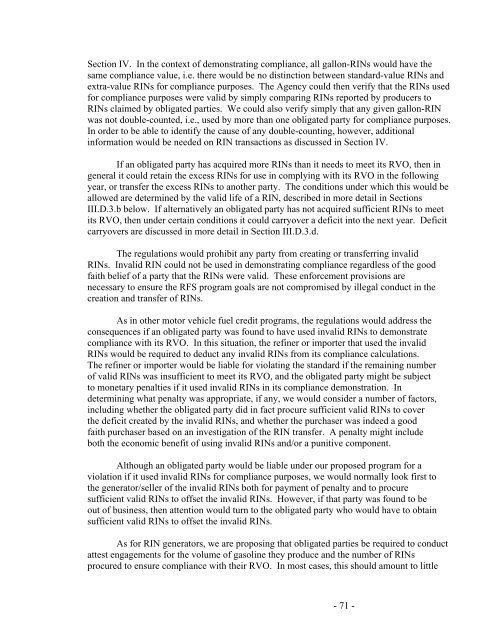Regulation of Fuels and Fuel Additives: Renewable Fuel Standard ...
Regulation of Fuels and Fuel Additives: Renewable Fuel Standard ...
Regulation of Fuels and Fuel Additives: Renewable Fuel Standard ...
Create successful ePaper yourself
Turn your PDF publications into a flip-book with our unique Google optimized e-Paper software.
Section IV. In the context <strong>of</strong> demonstrating compliance, all gallon-RINs would have the<br />
same compliance value, i.e. there would be no distinction between st<strong>and</strong>ard-value RINs <strong>and</strong><br />
extra-value RINs for compliance purposes. The Agency could then verify that the RINs used<br />
for compliance purposes were valid by simply comparing RINs reported by producers to<br />
RINs claimed by obligated parties. We could also verify simply that any given gallon-RIN<br />
was not double-counted, i.e., used by more than one obligated party for compliance purposes.<br />
In order to be able to identify the cause <strong>of</strong> any double-counting, however, additional<br />
information would be needed on RIN transactions as discussed in Section IV.<br />
If an obligated party has acquired more RINs than it needs to meet its RVO, then in<br />
general it could retain the excess RINs for use in complying with its RVO in the following<br />
year, or transfer the excess RINs to another party. The conditions under which this would be<br />
allowed are determined by the valid life <strong>of</strong> a RIN, described in more detail in Sections<br />
III.D.3.b below. If alternatively an obligated party has not acquired sufficient RINs to meet<br />
its RVO, then under certain conditions it could carryover a deficit into the next year. Deficit<br />
carryovers are discussed in more detail in Section III.D.3.d.<br />
The regulations would prohibit any party from creating or transferring invalid<br />
RINs. Invalid RIN could not be used in demonstrating compliance regardless <strong>of</strong> the good<br />
faith belief <strong>of</strong> a party that the RINs were valid. These enforcement provisions are<br />
necessary to ensure the RFS program goals are not compromised by illegal conduct in the<br />
creation <strong>and</strong> transfer <strong>of</strong> RINs.<br />
As in other motor vehicle fuel credit programs, the regulations would address the<br />
consequences if an obligated party was found to have used invalid RINs to demonstrate<br />
compliance with its RVO. In this situation, the refiner or importer that used the invalid<br />
RINs would be required to deduct any invalid RINs from its compliance calculations.<br />
The refiner or importer would be liable for violating the st<strong>and</strong>ard if the remaining number<br />
<strong>of</strong> valid RINs was insufficient to meet its RVO, <strong>and</strong> the obligated party might be subject<br />
to monetary penalties if it used invalid RINs in its compliance demonstration. In<br />
determining what penalty was appropriate, if any, we would consider a number <strong>of</strong> factors,<br />
including whether the obligated party did in fact procure sufficient valid RINs to cover<br />
the deficit created by the invalid RINs, <strong>and</strong> whether the purchaser was indeed a good<br />
faith purchaser based on an investigation <strong>of</strong> the RIN transfer. A penalty might include<br />
both the economic benefit <strong>of</strong> using invalid RINs <strong>and</strong>/or a punitive component.<br />
Although an obligated party would be liable under our proposed program for a<br />
violation if it used invalid RINs for compliance purposes, we would normally look first to<br />
the generator/seller <strong>of</strong> the invalid RINs both for payment <strong>of</strong> penalty <strong>and</strong> to procure<br />
sufficient valid RINs to <strong>of</strong>fset the invalid RINs. However, if that party was found to be<br />
out <strong>of</strong> business, then attention would turn to the obligated party who would have to obtain<br />
sufficient valid RINs to <strong>of</strong>fset the invalid RINs.<br />
As for RIN generators, we are proposing that obligated parties be required to conduct<br />
attest engagements for the volume <strong>of</strong> gasoline they produce <strong>and</strong> the number <strong>of</strong> RINs<br />
procured to ensure compliance with their RVO. In most cases, this should amount to little<br />
- 71 -
















